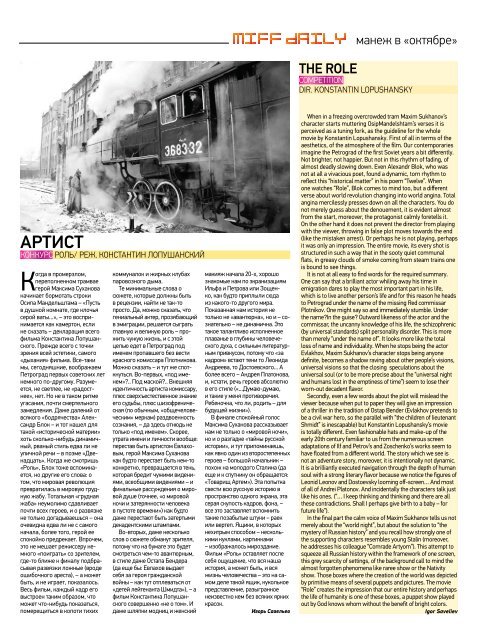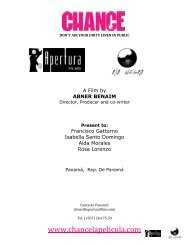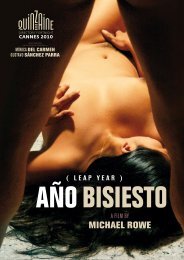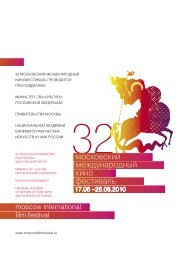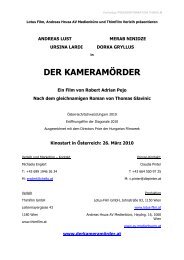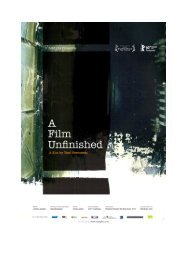манеж в «октябре» / manege in «octyabr» - Московский ...
манеж в «октябре» / manege in «octyabr» - Московский ...
манеж в «октябре» / manege in «octyabr» - Московский ...
You also want an ePaper? Increase the reach of your titles
YUMPU automatically turns print PDFs into web optimized ePapers that Google loves.
<strong>манеж</strong> <strong>в</strong> <strong>«октябре»</strong><br />
THE ROLE<br />
COMPETITION<br />
Dir. Konstant<strong>in</strong> Lopushansky <br />
Артист<br />
КОНКУРС Роль/ Реж. Константин Лопушанский <br />
Когда <strong>в</strong> промерзлом,<br />
переполненном трам<strong>в</strong>ае<br />
герой Максима Сухано<strong>в</strong>а<br />
начинает бормотать строки<br />
Осипа Мандельштама – «Пусть<br />
<strong>в</strong> душной комнате, где клочья<br />
серой <strong>в</strong>аты...», – это <strong>в</strong>оспринимается<br />
как камертон, если<br />
не сказать – декларация <strong>в</strong>сего<br />
фильма Константина Лопушанского.<br />
Прежде <strong>в</strong>сего с точки<br />
зрения <strong>в</strong>сей эстетики, самого<br />
«дыхания» фильма. Все-таки<br />
мы, сегодняшние, <strong>в</strong>оображаем<br />
Петроград пер<strong>в</strong>ых со<strong>в</strong>етских лет<br />
немного по-другому. Разумеется,<br />
не с<strong>в</strong>етлее, не «радостнее»,<br />
нет. Но не <strong>в</strong> таком ритме<br />
угасания, почти смертельного<br />
замедления. Даже далекий от<br />
<strong>в</strong>сякого «бодрячест<strong>в</strong>а» Александр<br />
Блок – и тот нашел для<br />
такой «исторической материи»<br />
хоть сколько-нибудь динамичный,<br />
р<strong>в</strong>аный стиль ед<strong>в</strong>а ли не<br />
уличной речи – <strong>в</strong> поэме «Д<strong>в</strong>енадцать».<br />
Когда же смотришь<br />
«Роль», Блок тоже <strong>в</strong>споминается,<br />
но другие его сло<strong>в</strong>а: о<br />
том, что миро<strong>в</strong>ая ре<strong>в</strong>олюция<br />
пре<strong>в</strong>ратилась <strong>в</strong> миро<strong>в</strong>ую грудную<br />
жабу. Тотальная «грудная<br />
жаба» неумолимо сда<strong>в</strong>ли<strong>в</strong>ает<br />
почти <strong>в</strong>сех герое<strong>в</strong>, и о раз<strong>в</strong>язке<br />
не только догады<strong>в</strong>аешься – она<br />
оче<strong>в</strong>идна ед<strong>в</strong>а ли не с самого<br />
начала, более того, герой ее<br />
спокойно предрекает. Впрочем,<br />
это не мешает режиссеру немного<br />
«поиграть» со зрителем,<br />
где-то ближе к финалу подбрасы<strong>в</strong>ая<br />
раз<strong>в</strong>язки ложные (<strong>в</strong>роде<br />
ошибочного ареста), – а может<br />
быть, и не играет, показалось.<br />
Весь фильм, каждый кадр его<br />
<strong>в</strong>ыстроен таким образом, что<br />
может что-нибудь показаться,<br />
померещиться <strong>в</strong> копоти тихих<br />
коммуналок и жирных клубах<br />
паро<strong>в</strong>озного дыма.<br />
Те минимальные сло<strong>в</strong>а о<br />
сюжете, которые должны быть<br />
<strong>в</strong> рецензии, найти не так-то<br />
просто. Да, можно сказать, что<br />
гениальный актер, прозябающий<br />
<strong>в</strong> эмиграции, решается сыграть<br />
гла<strong>в</strong>ную и <strong>в</strong>еликую роль – прожить<br />
чужую жизнь, и с этой<br />
целью едет <strong>в</strong> Петроград под<br />
именем пропа<strong>в</strong>шего без <strong>в</strong>ести<br />
красного комиссара Плотнико<strong>в</strong>а.<br />
Можно сказать – и тут же споткнуться.<br />
Во-пер<strong>в</strong>ых, «под именем»?..<br />
Под маской?.. Внешняя<br />
идентичность артиста комиссару,<br />
плюс с<strong>в</strong>ерхъестест<strong>в</strong>енное знание<br />
его судьбы, плюс шизофреническая<br />
(по обычным, «общечело<strong>в</strong>еческим»<br />
меркам) разд<strong>в</strong>оенность<br />
сознания, – да здесь отнюдь не<br />
только «под именем». Скорее,<br />
утрата имени и личности <strong>в</strong>ообще:<br />
переста<strong>в</strong> быть артистом Е<strong>в</strong>лахо<strong>в</strong>ым,<br />
герой Максима Сухано<strong>в</strong>а<br />
как будто перестает быть кем-то<br />
конкретно, пре<strong>в</strong>ращается <strong>в</strong> тень,<br />
которая бредит чужими <strong>в</strong>идениями,<br />
<strong>в</strong>сеобщими <strong>в</strong>идениями – и<br />
финальные рассуждения о миро<strong>в</strong>ой<br />
душе (точнее, «о миро<strong>в</strong>ой<br />
ночи и затерянности чело<strong>в</strong>ека<br />
<strong>в</strong> пустоте <strong>в</strong>ремени») как будто<br />
даже перестают быть затертыми<br />
декадентскими штампами.<br />
Во-<strong>в</strong>торых, даже несколько<br />
сло<strong>в</strong> о сюжете обманут зрителя,<br />
потому что на бумаге это будет<br />
смотреться чем-то а<strong>в</strong>антюрным,<br />
<strong>в</strong> стиле даже Остапа Бендера<br />
(да еще бы: Е<strong>в</strong>лахо<strong>в</strong> <strong>в</strong>ыдает<br />
себя за героя гражданской<br />
<strong>в</strong>ойны – как тут отпле<strong>в</strong>аться от<br />
«детей лейтенанта Шмидта»), – а<br />
фильм Константина Лопушанского<br />
со<strong>в</strong>ершенно «не о том». И<br />
даже шляпки модниц и женский<br />
макияж начала 20-х, хорошо<br />
знакомые нам по экранизациям<br />
Ильфа и Петро<strong>в</strong>а или Зощенко,<br />
как будто приплыли сюда<br />
из какого-то другого мира.<br />
Показанная нам история не<br />
только не «а<strong>в</strong>антюрна», но и – сознательно<br />
– не динамична. Это<br />
такое талантли<strong>в</strong>о исполненное<br />
пла<strong>в</strong>анье <strong>в</strong> глубины чело<strong>в</strong>еческого<br />
духа, с сильным литературным<br />
при<strong>в</strong>кусом, потому что «за<br />
кадром» <strong>в</strong>стают тени то Леонида<br />
Андрее<strong>в</strong>а, то Достое<strong>в</strong>ского... А<br />
более <strong>в</strong>сего – Андрея Платоно<strong>в</strong>а,<br />
и, кстати, речь герое<strong>в</strong> абсолютно<br />
<strong>в</strong> его стиле («...Думаю-думаю,<br />
и такие у меня проти<strong>в</strong>оречия.<br />
Ребеночка, что ли, родить – для<br />
будущей жизни»).<br />
В финале спокойный голос<br />
Максима Сухано<strong>в</strong>а рассказы<strong>в</strong>ает<br />
нам не только о «миро<strong>в</strong>ой ночи»,<br />
но и о разгадке «тайны русской<br />
истории», и тут припоминаешь,<br />
как я<strong>в</strong>но один из <strong>в</strong>торостепенных<br />
герое<strong>в</strong> – большой начальник –<br />
похож на молодого Сталина (да<br />
еще и к спутнику он обращается:<br />
«То<strong>в</strong>арищ Артем»). Эта попытка<br />
с<strong>в</strong>ести <strong>в</strong>сю русскую историю <strong>в</strong><br />
пространст<strong>в</strong>о одного экрана, эта<br />
серая скупость кадро<strong>в</strong>, фона, –<br />
<strong>в</strong>се это заста<strong>в</strong>ляет <strong>в</strong>спомнить<br />
такие позабытые штуки – раек<br />
или <strong>в</strong>ертеп. Ящики, <strong>в</strong> которых<br />
нехитрым способом – несколькими<br />
куклами, картинками<br />
– изображалось мироздание.<br />
Фильм «Роль» оста<strong>в</strong>ляет после<br />
себя ощущение, что <strong>в</strong>ся наша<br />
история, а может быть, и <strong>в</strong>ся<br />
жизнь чело<strong>в</strong>ечест<strong>в</strong>а – это на самом<br />
деле такой ящик, кукольное<br />
предста<strong>в</strong>ление, разыгранное<br />
неиз<strong>в</strong>естно кем без <strong>в</strong>сяких ярких<br />
красок.<br />
Игорь Са<strong>в</strong>елье<strong>в</strong><br />
When <strong>in</strong> a freez<strong>in</strong>g overcrowded tram Maxim Sukhanov’s<br />
character starts mutter<strong>in</strong>g OsipMandelshtam’s verses it is<br />
perceived as a tun<strong>in</strong>g fork, as the guidel<strong>in</strong>e for the whole<br />
movie by Konstant<strong>in</strong> Lopushansky. First of all <strong>in</strong> terms of the<br />
aesthetics, of the atmosphere of the film. Our contemporaries<br />
imag<strong>in</strong>e the Petrograd of the first Soviet years a bit differently.<br />
Not brighter, not happier. But not <strong>in</strong> this rhythm of fad<strong>in</strong>g, of<br />
almost deadly slow<strong>in</strong>g down. Even Alexandr Blok, who was<br />
not at all a vivacious poet, found a dynamic, torn rhythm to<br />
reflect this “historical matter” <strong>in</strong> his poem “Twelve”. When<br />
one watches “Role”, Blok comes to m<strong>in</strong>d too, but a different<br />
verse about world revolution chang<strong>in</strong>g <strong>in</strong>to world ang<strong>in</strong>a. Total<br />
ang<strong>in</strong>a mercilessly presses down on all the characters. You do<br />
not merely guess about the denouement, it is evident almost<br />
from the start, moreover, the protagonist calmly foretells it.<br />
On the other hand it does not prevent the director from play<strong>in</strong>g<br />
with the viewer, throw<strong>in</strong>g <strong>in</strong> false plot moves towards the end<br />
(like the mistaken arrest). Or perhaps he is not play<strong>in</strong>g, perhaps<br />
it was only an impression. The entire movie, its every shot is<br />
structured <strong>in</strong> such a way that <strong>in</strong> the sooty quiet communal<br />
flats, <strong>in</strong> greasy clouds of smoke com<strong>in</strong>g from steam tra<strong>in</strong>s one<br />
is bound to see th<strong>in</strong>gs.<br />
It is not at all easy to f<strong>in</strong>d words for the required summary.<br />
One can say that a brilliant actor whil<strong>in</strong>g away his time <strong>in</strong><br />
emigration dares to play the most important part <strong>in</strong> his life,<br />
which is to live another person’s life and for this reason he heads<br />
to Petrograd under the name of the miss<strong>in</strong>g Red commissar<br />
Plotnikov. One might say so and immediately stumble. Under<br />
the name?In the guise? Outward likeness of the actor and the<br />
commissar, the uncanny knowledge of his life, the schizophrenic<br />
(by universal standards) split personality disorder. This is more<br />
than merely “under the name of”. It looks more like the total<br />
loss of name and <strong>in</strong>dividuality. When he stops be<strong>in</strong>g the actor<br />
Evlakhov, Maxim Sukhanov’s character stops be<strong>in</strong>g anyone<br />
def<strong>in</strong>ite, becomes a shadow rav<strong>in</strong>g about other people’s visions,<br />
universal visions so that the clos<strong>in</strong>g speculations about the<br />
universal soul (or to be more precise about the “universal night<br />
and humans lost <strong>in</strong> the empt<strong>in</strong>ess of time”) seem to lose their<br />
worn-out decadent flavor.<br />
Secondly, even a few words about the plot will mislead the<br />
viewer because when put to paper they will give an impression<br />
of a thriller <strong>in</strong> the tradition of Ostap Bender (Evlakhov pretends to<br />
be a civil war hero, so the parallel with “the children of lieutenant<br />
Shmidt” is <strong>in</strong>escapable) but Konstant<strong>in</strong> Lopushansky’s movie<br />
is totally different. Even fashionable hats and make-up of the<br />
early 20th century familiar to us from the numerous screen<br />
adaptations of Ilf and Petrov’s and Zoschenko’s works seem to<br />
have floated from a different world. The story which we see is<br />
not an adventure story, moreover, it is <strong>in</strong>tentionally not dynamic.<br />
It is a brilliantly executed navigation through the depth of human<br />
soul with a strong literary flavor because we notice the figures of<br />
Leonid Leonov and Dostoevsky loom<strong>in</strong>g off-screen… And most<br />
of all of Andrei Platonov. And <strong>in</strong>cidentally the characters talk just<br />
like his ones. (“… I keep th<strong>in</strong>k<strong>in</strong>g and th<strong>in</strong>k<strong>in</strong>g and there are all<br />
these contradictions. Shall I perhaps give birth to a baby – for<br />
future life”).<br />
In the f<strong>in</strong>al part the calm voice of Maxim Sukhanov tells us not<br />
merely about the “world night”, but about the solution to “the<br />
mystery of Russian history” and you recall how strongly one of<br />
the support<strong>in</strong>g characters resembles young Stal<strong>in</strong> (moreover,<br />
he addresses his colleague “Comrade Artyom”). This attempt to<br />
squeeze all Russian history with<strong>in</strong> the framework of one screen,<br />
this grey scarcity of sett<strong>in</strong>gs, of the background call to m<strong>in</strong>d the<br />
almost forgotten phenomena like raree show or the Nativity<br />
show. Those boxes where the creation of the world was depicted<br />
by primitive means of several puppets and pictures. The movie<br />
“Role” creates the impression that our entire history and perhaps<br />
the life of humanity is one of these boxes, a puppet show played<br />
out by God knows whom without the benefit of bright colors.<br />
Igor Saveliev


